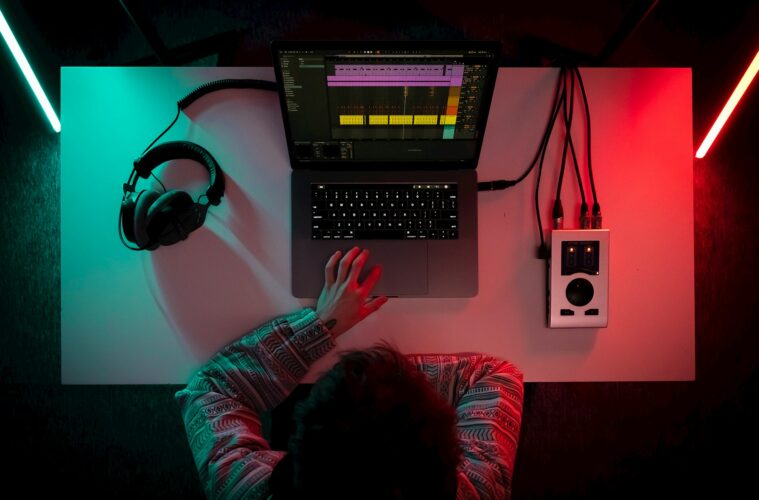In the world of music production, choosing the right digital audio workstation (DAW) can be a daunting task. With the myriad of options available, each boasting unique features and capabilities, deciding between software like GarageBand, Ableton Live, and Logic Pro can seem overwhelming. Whether you’re a novice musician or a seasoned producer, understanding the differences between these popular DAWs is crucial in determining which one best suits your needs.
GarageBand vs Ableton Live vs Logic Pro
GarageBand: The Beginner’s Playground
GarageBand, developed by Apple, is often hailed as the entry point for aspiring musicians and hobbyists. Bundled with every Mac and iOS device, GarageBand offers a user-friendly interface and a wide array of virtual instruments, loops, and effects, making it ideal for those new to music production. Its intuitive design allows users to quickly lay down tracks, arrange compositions, and experiment with different sounds without the steep learning curve associated with more advanced DAWs.
One of GarageBand’s standout features is its accessibility. Its simplicity and affordability make it an attractive option for beginners or those looking to sketch out musical ideas on the fly. Additionally, GarageBand seamlessly integrates with other Apple products, enabling users to transfer projects between their Mac, iPhone, and iPad effortlessly.
However, GarageBand does have its limitations, particularly for more experienced users. Its basic editing tools and lack of advanced features may leave professional producers craving more flexibility and control over their compositions. While GarageBand serves as an excellent starting point for budding musicians, it may eventually feel restrictive as users’ skills and ambitions grow.
Ableton Live: The Live Performance Powerhouse
Ableton Live has become synonymous with electronic music production and live performance, thanks to its innovative approach to composition and its robust set of features tailored for both studio and stage use. Unlike traditional linear DAWs, Live employs a unique session view that allows users to trigger and manipulate clips in real-time, making it a favourite among DJs, electronic artists, and performers seeking spontaneity and improvisation in their sets.
One of Live’s greatest strengths is its versatility. With a comprehensive suite of instruments, effects, and MIDI tools, users can create intricate arrangements, manipulate audio in creative ways, and experiment with complex rhythmic patterns. Live’s intuitive workflow encourages experimentation and fosters a fluid creative process, making it a favourite among producers looking to break free from the constraints of traditional composition.
Moreover, Live’s extensive library of third-party plugins and Max for Live integration further extends its capabilities, allowing users to customise their setup to suit their specific needs. Whether you’re producing electronic music, remixing tracks, or performing live, Ableton Live offers the tools and flexibility to bring your ideas to life with precision and flair.
Despite its strengths, Ableton Live does have a learning curve, especially for newcomers to music production. Its non-linear approach and unconventional interface may initially confuse some users accustomed to more traditional DAWs like GarageBand or Logic Pro. Additionally, Live’s pricing structure may deter budget-conscious musicians, as it can be significantly more expensive than entry-level options like GarageBand.
Logic Pro: The Professional Workhorse
Logic Pro, also developed by Apple, is often regarded as the gold standard in professional music production. Packed with advanced features, industry-leading virtual instruments, and a vast array of mixing and mastering tools, Logic Pro caters to the needs of serious producers, engineers, and composers seeking a comprehensive solution for their creative endeavours.
One of Logic Pro’s standout features is its expansive sound library. From realistic orchestral instruments to cutting-edge synthesisers and samplers, Logic Pro offers a diverse range of sonic possibilities to suit any musical style or genre. Its robust MIDI editing capabilities, advanced automation tools, and professional-grade effects make it a go-to choice for producers working on everything from pop hits to film scores.
Moreover, Logic Pro’s seamless integration with other Apple products, including GarageBand and iCloud, facilitates collaboration and workflow efficiency, allowing users to transition seamlessly between devices and projects. Its intuitive interface, coupled with powerful features like Flex Time, Drummer, and Smart Tempo, streamlines the music production process, enabling users to focus on their creativity without getting bogged down by technical complexities.
Despite its impressive capabilities, Logic Pro may be overkill for beginners or casual musicians, especially considering its higher price point compared to GarageBand. Its advanced features and professional-grade tools may also be intimidating for those new to music production, requiring a significant investment of time and effort to master fully.
Conclusion: Choosing the Right DAW
In the end, the choice between GarageBand, Ableton Live, and Logic Pro boils down to your individual needs, preferences, and budget. If you’re just starting out or looking for a straightforward, user-friendly DAW for sketching out musical ideas, GarageBand offers an excellent entry point at no additional cost. For electronic musicians, DJs, and live performers seeking flexibility and creativity, Ableton Live provides a dynamic platform for experimentation and performance. And for professional producers, composers, and engineers demanding the utmost in power and precision, Logic Pro stands as a comprehensive solution for realising their musical visions.
Ultimately, the best DAW is the one that empowers you to express yourself creatively and effectively, regardless of its name or reputation. Whether you’re crafting chart-topping hits, experimenting with avant-garde soundscapes, or simply jamming with friends, the right DAW is the one that feels like an extension of your musical identity, enabling you to unleash your full artistic potential with confidence and ease.




